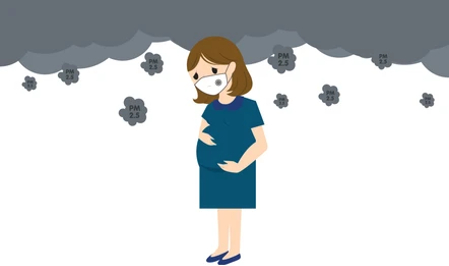Is There a Connection Between Pollution and Congenital Heart Defects?
January 13, 2024 | Contributed by Diya Popli
Air pollution is currently one of the most pressing issues being faced globally. Not only it impacts the environment, but also affects our health and wellbeing in more ways than we realise. According to recent studies, exposure to high levels of pollution leads to a plethora of health issues including but not limited to asthma, cardiovascular issues, cancer, strokes and sometimes can even be the cause of cognitive decline and neurodegenerative diseases. Sadly, we have too often witnessed schools being closed due to high levels of pollution to prevent the children from exposure to the harmful effects of pollutants.
 New Delhi is one of the most polluted cities in the world.
New Delhi is one of the most polluted cities in the world.
Over the last couple of years, India has come to be known as one of the countries with the most polluted air. Towards the end of the year 2023, the national capital of India – New Delhi, with an AQI (Air Quality Index) of 640, became one of the most polluted cities in the world. These numbers are frighteningly jarring and their effect on the human population, worse.
Air pollution is the result of a mix of several components including Particulate Matter (PM 10 and PM 2.5), Nitrogen Oxide, Carbon Monoxide, Methane, lead and other harmful gases.
According to some doctors working on heart disorder treatment, PM 10 and PM 2.5, which are tiny particles suspended in air have been associated with a greater risk of congenital heart anomalies.
The Impact of Pollution on Health:
 Exposure of a pregnant mother to pollutants can impact the health of the foetus
Exposure of a pregnant mother to pollutants can impact the health of the foetus
Respiratory Infections
People with already existing medical conditions find themselves being severely affected by the pollutants present in their environment. Exposure to pollutants and in particular PM 2.5 can exacerbate the respiratory conditions such as Asthma. It is also not common to find children and adults developing respiratory infections due to the high pollution levels. In addition to respiratory infections, pollution can also cause lung, throat, and eye irritation.
Cardiovascular Disease in Adults
According to some Heart Foundation India, PM 10 and PM 2.5 can penetrate deep into the lungs and the bloodstream. Once in the body, they can cause several adverse effects on the cardiovascular system. According to a study “Air Pollution Exposure and Cardiovascular Disease” Both PM2.5 and PM10 air pollution concentrations have a marked and close association with adverse health effects, such as heart disease, stroke, blood pressure, and cardiovascular diseases. Air pollution not only impacts the heart health of adults but also of children. Research indicates that children exposed to air pollution maybe at a greater risk of developing cardiovascular conditions later in life.
Congenital Heart Defects
Several studies conducted recently have also established a connection between air pollution and congenital malformations. The impact of air pollution extends beyond direct respiratory effects, influencing lung development indirectly through factors such as low birth weight, premature birth, and compromised immune system development. These ramifications are particularly significant due to the intricate relationship between prenatal exposure to air pollution and its potential interference with organ development.
Certain studies have ascertained that air pollutants may beget various Congenital Anomalies in IVF (In-Vitro Fertilisation) babies. Moreover, air pollution has also come to be increasingly associated with Congenital Heart Defects. It has been found that exposure to pollutants in the gestational period has contributed to the development of Congenital Heart Defects, which have the potential to severely affect the health of the child. Maternal exposure to ambient air pollution, especially in the first trimester of pregnancy has proven harmful. Exposure to gases such as O3, NO2, SO2 and CO during pregnancy have been found to increase chances of developing Congenital Heart Defects. Though a congenital heart disorder treatment is available today, we must do what we can to prevent these.
Source : World Heart Federation
What is it that we can do?
With soaring levels of pollution and its contribution towards the development of congenital heart defects, we must as individuals do our bit to help prevent the same. Every act, as small as it may be, counts. While systemic changes are necessary and, in the pipeline, our contributions towards the issue on an individual level hold just as much significance. Here’s what we can do:
- Take steps to reduce pollution: Starting from the confines of our individual homes we can take concrete steps to ensure that we play our part in reducing pollution. This includes adopting eco-friendly practices, trying to limit the use of transportation where possible and take steps to reduce carbon footprints.
- Spread Awareness: Many people are just not fully aware of the harmful effects of air pollution. Once people become more aware of how pollution is impacting their and their loved one’s health, there is a greater chance for them to adopt practices that help minimise pollution.
- Support Initiatives to help reduce pollution: Participate and support the initiatives, activities and events that support the cause. These events may be of the likes of clean up drives, awareness generation events, tree-planting drives etc.
- Support the use of clean energy: Work towards reducing the usage of fossil fuels and switch the cleaner energy sources. Make use of renewable sources of energy such as wind, solar energy, hydropower etc. Promote more sustainable practices.
- Using air purifiers to improve quality of air indoors: This is important especially for pregnant women or those suffering from some defect. Ensuring clean air and proper ventilation is of paramount importance.
- Adopting sustainable practices: Make sustainable practices a part of your daily lives. These may be in the form of reducing the use of single-use plastics, buying eco-friendly products, investing in sustainable fashion etc.
- Modifying your lifestyle during pregnancy: Minimise exposure to pollutants while trying to conceive and during pregnancy. One may consult their doctor regarding the same and adopt healthier habits such as a healthy diet, avoid direct and passive smoking and regular exercise.
We must understand the power we hold as individuals to facilitate a positive change. As they say, “Be the change you want see.” Given the dire circumstances right now, especially with regard to the levels of pollution and climate change, it is essential we take necessary actions to ensure happy and healthy lives for ourselves and the generations to come.
References
https://www.cleanairfund.org/theme/health/
https://www.sciencedirect.com/science/
Yang BY, Qu Y, Guo Y, Markevych I, Heinrich J, Bloom MS, Bai Z, Knibbs LC, Li S, Chen G, Jalaludin B, Morawska L, Gao M, Han B, Yu Y, Liu XX, Ou Y, Mai J, Gao X, Wu Y, Nie Z, Zeng XW, Hu LW, Shen X, Zhou Y, Lin S, Liu X, Dong GH. Maternal exposure to ambient air pollution and congenital heart defects in China. Environ Int. 2021 Aug;153:106548. doi: 10.1016/j.envint.2021.106548. Epub 2021 Apr 7. PMID: 33838617.

